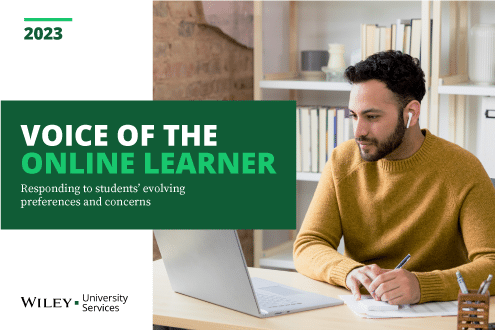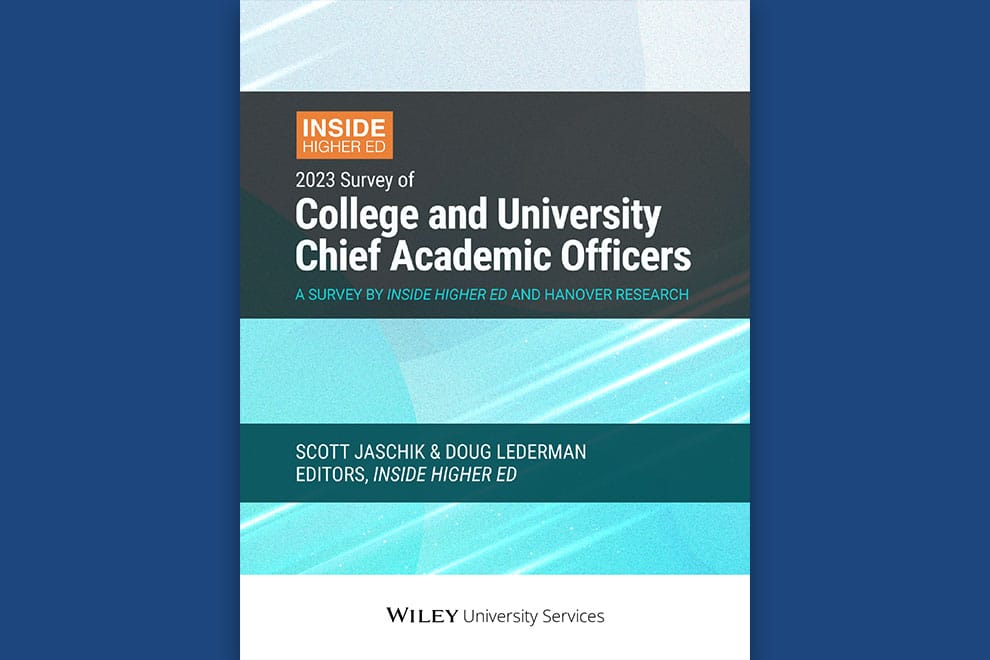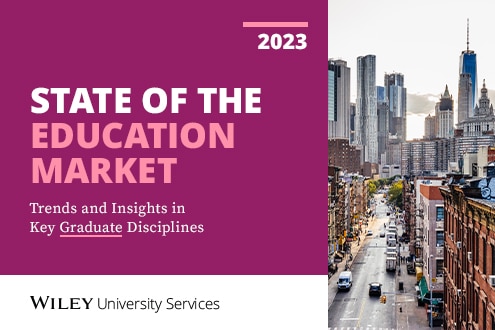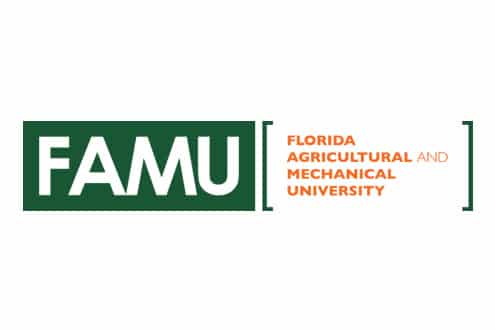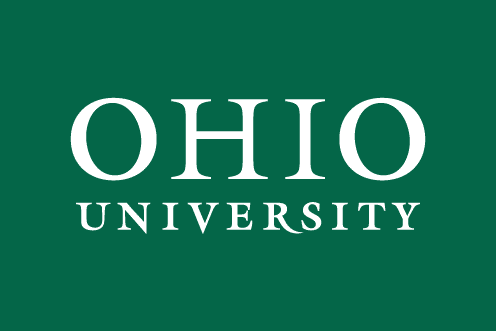Speaker 1:
You’re listening to An Educated Guest, a podcast that brings together great minds in higher ed to delve deeper into the innovations and trends guiding the future of education and careers. Hosted by the Executive Vice President & GM of Wiley University Services and Talent Development, Todd Zipper.
Todd Zipper:
Hello, I am Todd Zipper host of An Educated Guest. On today’s show I speak with Eric Bing chancellor and CEO of the College of Healthcare Professions. Under Eric’s leadership enrollments are growing over 20% per year and mostly through referrals. He also designed in developed innovative adult learner centric, flipped classroom curriculum, now you used across the network. The college is now the largest provider of allied health graduates in Texas key takeaways from our discussion today. First, 70 million adult learners today need reskilling and upskilling, but don’t have the luxury of time. Second, the traditional colleges were not built for the adult learner living complicated lives, their model centers on four pillars to help adult learners with complicated lives succeed, including earn and learn flexible, but structured, relevance of the education and continuous student support. Third, they focus on job placement above graduation. Career services built into the curriculum from day one. They have an unprecedented 86% job placement rate last year.
Todd Zipper:
And lastly, for every dollar invested in education, alumni received 9.4 times return. And on average, $15,000 more in salary upon a completion of a certificate program. It is always a pleasure to speak to guests who are in the higher ed industry at the nexus of accessibility, affordability, and outcomes. With COVID putting the spotlight on healthcare professionals and has become increasingly important to highlight providers in the industry who are at this nexus and delivering results at scale. I learned about the College of Healthcare Professions who are doing just that. I’m excited to have Eric CEO and chancellor of CHCP with us for today’s episode. Eric, thank you for being here today.
Eric Bing:
Hey, it’s great to be here, Todd.
Todd Zipper:
All right. So can you tell us a little bit about your background? How did you get into the higher ed space and what drew you to CHCP?
Eric Bing:
Well, it’s kind of a winding road, but my family has been an education for a very long time and a long history of educators back into the 18 hundreds, but that was not the path I was planning on taking, I’m kind of an entrepreneurial guy. But one of the things that happened in my career is I kind of moved and had a bunch of opportunities around the human capital side of healthcare. And so I’ve got over 20 plus years experience in that side. I used to be partners in a firm that trained and did preceptorships for nurses out of the Philippines coming into the US. I’ve done public private partnerships in East Africa, around vaccine management, capacity building between more university and Indiana university. A lot in the hospital systems was very involved when PEPFAR was working on the AIDS epidemic in Africa and have had travel, nursing and therapy companies that I have managed.
Eric Bing:
And the other side of it, that’s a little thing is, is before social impact was really the phrase, but I’ve always felt very blessed and in giving back and I used to chair AmeriCorps in Texas, I’ve done a lot in the food pantry side and you just understand where folks like we serve, adult learners with complicated lives are in their lives and what their hopes or dreams are, but also the hard realities. So that’s kind of a background that pulled me into CACP. CACP, I actually got involved in because I was wanting to build an allied health school in Kenya. I still don’t have that school, but after getting involved with CACP and through a few other twists and turns, I’ve ended up being the chancellor and really working on this transformation.
Todd Zipper:
Excellent. So I want to hit on a term you just use in terms of the adult learners. And I’m often hearing the phrase new majority as a phrase for them, that you have built this school around this adult learner that has complex lives. What do you mean by that? And can you paint a picture of what your student looks like?
Eric Bing:
So our provost, Dr. Joanitt Montano, she has a phrase that we take education to our aspiring professionals. We don’t expect them to come to us. And you look at, and the studies show their summer in between 30 and I’ve even seen before up to 70 million adult learners with some education or no education that need to be retooled, that need education. That, that’s a huge swath of just human capital that has so much potential. But if you also look at our educational model, that is based on a thousand year old model, that was really based on providing education to wealthy people and people of power or privilege who had the luxury of time. The reality is, is the adult learners of today in our society, that’s not what they have, but they are incredibly intelligent, they are aspiring, they are driven. And so when you build to that, you end up creating an environment that actually works with them.
Todd Zipper:
Yeah, that’s fantastic. So can we dive a little bit deeper and define the space of healthcare? Right? So we all think of a healthcare, we’re thinking especially during the pandemic, we’re thinking about nurses, we’re thinking about doctors, but it’s my understanding that your school really service as this larger allied health space, which sometimes, maybe the terms allied health and healthcare are used interchangeably. I’d love for you to kind of break down what this sector looks like in all these different types of healthcare professionals that can’t just show up to work and be trained on the job. They need to go through some sort of formal educational experience that your college obviously delivers here.
Eric Bing:
Yes. Happy to. So, when you’re looking at healthcare, you usually just hear about doctors and nurses and big hospital systems. If you think about COVID, what happened during COVID? Every night on the news, they were talking about a big hospital system somewhere, and they were talking about doctors and nurses. But, Wikipedia says that about 60% of the total healthcare workforce is allied health. And also if you look at healthcare, it’s not just happening in the hospital, it’s happening in ambulatory units, urgent cares, physician offices, imaging centers, and also hospitals these days are really beginning to move a lot of their patients home to heal. I’ve been hearing up to 25%, they’re trying to move home because you’re not going to have as many problems with infections, you’re not getting woken up every two hours poked and prodded see if you’re okay and you just heal better. So what happens is this whole ecosystem needs the allied health.
Eric Bing:
And we all know, as we hear all the time, there’s not enough doctors and nurses and the allied health fills that space. And what am I talking about in allied health? I’m talking about medical assistants, sonographers, rad techs, surgical technicians, ophthalmology techs, cardiovascular techs, coders and billers, physical therapy, dieticians, et cetera, et cetera. So it’s a large space and it is incredibly important to the ecosystem of quality healthcare, and becoming only more important as healthcare changes in the pandemic.
Todd Zipper:
Yeah, so I want to zoom around these programs that you’re offering at the college and a lot of things that you’re doing really resonates. We use this term at Wiley career connected education, right? This is kind of esoteric. And when I find models like yours, it sort of brings it to life. And so, could you sort of unpack your model, right? You use this term stackable credentials, which I hear all the time in the marketplace, but you guys are really making this work. And I know you had bachelor’s degrees, you still do, but you’ve sort of gone in a slightly different direction now. So can you kind of talk about your program offerings and your core beliefs, which I think are really around this career connected education model.
Eric Bing:
Sure. Be happy to. So before I do that, let me step back a little bit and give you some more details on who we consider an adult learner, because an adult learner, it’s an extraordinarily broad term. I mean, it can be somebody with a, bachelor’s getting a master or a PhD, or like for us, it can be somebody really in that bottom quintile, economically tons of first gen students. If you look at our stats 70% or 22 or older, 48% or parents, 85% come from the bottom 60th percent of income, 39% are first gen, 53% are Hispanic, 22% are African American, only about 14 and a half percent or Caucasian and 36% have tried college at some level before. So when you look at that, that demographic, it’s a very different person. And I want to make this real for you and anybody listening today.
Eric Bing:
And just imagine that you’re a single mom, you’re working fast food and car washes, and your name’s Justina King. You are a bear getting by and providing for yourself and your child. And then all of a sudden you find out you’re pregnant again for a second time. And it’s an extraordinarily scary situation. You don’t have the support network and you want to be a great mom and you want to be able to provide for your babies and provide them a better life, the American way. So you have to change your life now and you need to find something where you can upskill. So you’re not working part-time at a car wash. You go out and you try to find a program, but you’re also having to work all these crazy hours. You’ve got one kid, another one on the way, all these things. So you need a program that will work with your complicated life.
Eric Bing:
So at CHCP, what we’ve done is, and for Justina, who is a real person, she found our limited medical radiology tech program, which is a 13 month program that allowed her to quickly get a certification in radiology tech. And I will a little bit about all the pieces that go around that. But when she was able to do that in 13 months and not have to go for four years, which is so difficult and almost impossible for anybody living day to day, quite frankly, it’s very hard to even get an associates. In this earn and learn model she was able to be hired by an amazing employer, Calvary Urgent Care. She stabilizes her life, she has her baby. She enjoys the baby and this newfound freedom of not having to worry about having a roof over her head, food, any of those things, but then she wants to do more. But her life’s busier than ever.
Eric Bing:
So what she’s now able to do through our programs, the way we built on is stack that without losing one credit into a radiology tech program. Calvary Urgent Care is happy to help her because they don’t want to have turnover in what they’re doing. They know that happy and having diversity of employees improves healthcare outcomes. And so help her with her schedule to make sure she’s able to do that. Now, what we have is quality community healthcare. We have an amazing individual Justina who has moved her life and her family’s life forever. So that kind of gives you the story of where we are. But when you look at what our model has done and what you’re talking about, it really comes down to four pillars. One is, is as what was so needed for Justina is, is we’re doing earn and learn.
Eric Bing:
We have certificates, almost all of them are nine months. Other than that, LMRT one, I just talked about the limited medical radiology tech that you not only are getting a certificate, but you’re getting a national certification. And then you can a hundred percent bulk transfer that into an associate’s completion program. And when you’re ready, if you want to, you can bulk transfer for that into a bachelor’s completion program. We don’t even offer bachelors anymore. The other thing is, is you’ve got to have flexibility, but structure. If you’re the first in your family, 39% of our students are first gen. In the Hispanic population 74% are first gen going to college. You can’t expect them to figure out what to take out of some huge college catalog. So what you need to do is give them a structured pathway to get them on their way for these certs so if they can get through, stabilize their lives, have confidence again, because fear is the number one issue that we see out there with our folks, that are aspiring professionals that are trying for the career of their life.
Eric Bing:
And then they can move on to an associates and a bachelor. So flexible with structure. The third is, is their goal and Strata did an amazing study on this around relevance is, the relevance of the education. And the relevance of the education for who we’re serving is really about getting a professional career and getting out of the churn of all this part-time retail and pieces that they can’t live on. So for us, we’re starting day one, helping them to understand what it’s like to be in a professional career, not waiting till the end. And also we have a large employer network. We have about 1500 deep partnerships with employers. And if you look at over the last year, we placed people with over 2100 employers or 3,300 graduates that we did last year. And in the last five years, we’ve placed with over 5,000 employers.
Eric Bing:
So we have that employer base, but also if you think about it, if you’ve never in your family, had anybody in a professional setting, it’s like dropping somebody into China and expecting them to speak Chinese and understand the Chinese culture. And hospitals and medical is really crazy with all the different acronyms and everything else they use. So we start at the beginning. So then when they get to their externship, which we have, which is their clinical piece, we have all set up for them. They go right into that while they’re still in their programs and a tremendous amount of them are hired directly from extern to hire. And the last piece is really continuous student support inside and outside the classroom. This is showing that we care.
Eric Bing:
We have these eye care values, innovation, compassion, accountability, respect, and excellence. And first of all, we have to have an environment that is respectful of our student students and where they come from, and also compassionate to what is going on in their lives. But the other piece is, if you don’t hold them accountable, it’s all going to fail anyhow, because they’ll never be successful in their career. But when you wrap those three things together, you get unbelievable results. And that is really those four pieces really tie in to what we are doing.
Todd Zipper:
Yeah, that’s really fantastic. And we’ll get to some of the incredible outcomes that you’re producing here. But I just want to emphasize career services and talk about that. Because every school has career services, right? Whether it’s traditional students or the adult learner there, there’s some department, there’s some office that they can go into to get resume help, or maybe there’s some employers that come to campus of some kind. It appears that you have taken career services to the next level, there’s innovations here and wrapped up in everything you were just talking about. Maybe you could just underscore how you’ve made careers services, an essential part of the curriculum it sounds like from day one.
Eric Bing:
So it’s interesting because if you look at the history of the college of healthcare professions, we were originally an internal training school for the McGregor clinics in the Texas medical center. So everybody that we were graduating, they were going into work in the industry street, right? In McGregor clinics, in the medical center and around Texas. So you sure as heck, weren’t going to produce somebody that couldn’t do the job internally. And from our standpoint, we know our students, when you have such a high number that have never had a professional setting anywhere in their family’s ecosystem, that you’ve got to start at the beginning. I’ll tell you, there’s lots of little things we do. First of all, in our campuses, our career services center are in the lobby in the front. You have some of them. You actually have to walk through to go to your classes in what’s happening.
Eric Bing:
That sends a signal. The other thing for us is we’re not about graduation, we are about placement. This year, we placed 86%, we run July through June. 86% of our students. But that happens because of all of these pieces of understanding where the students are coming from, from both a soft skill and a hard skill. In our online programs, we have a lot of interesting, flexible online programs at all the didactics online, but then there’s boot camps for clinicals on Friday, Saturdays for single moms and such. Their first mod, every single one of their mods, they have assignments that tie to career services. So that they actually have to do activities and start, it’s not in the end of their nine month program or associates or bachelor’s completion that all of a sudden, we’re like, it’s time to get your resume together and start.
Eric Bing:
We’re starting right at the beginning, helping them understand having people come in and talk to them. Fellow students who look like them and have similar backgrounds, they’re learning to work on their resume, how to communicate. There’s all sorts of things in doing interviewing. If you ask somebody who’s never done a professional interviewing tell me about yourself. You might get a very different story than you are thinking you would get in a professional setting. We do a lot of work around all these online applications because they are extremely detrimental to people getting through. And we have a lot of our employer partners who are right there by our side because they know they don’t work. And these are people who are already externing for them that they want to hire. So all of these little pieces built in what we are doing throughout so that when they get to that externship, which is really interesting too, because that is the second other than when students start, that’s the second highest probability of somebody dropping.
Eric Bing:
And even though they might be a straight, a student, never missed it a day of class, all of a sudden they get scared and things come up. But if you created that comfort level and they understand the environment they’re going into better, they’ll never know until they’re in it, that you can create great outcomes.
Todd Zipper:
Yeah. I mean, when you take your graduation rate, I love the way you position that it’s not about graduation, it’s about making a level wage, having a great career, and that’s what you’re, you’re judging yourselves against. And when you take your graduation rates, your placement rates and combine them, it’s really top tier against almost any comparison, especially when you think about other vocational type of programs. I want to talk a bit about your educational model. You have a lot of campuses in Texas, that’s primarily where you operate, but you also have online and you have hybrid, you have a big clinical placement component. So a lot of in person aspects. How has the model evolved in terms of on ground versus online? How did you all fare sort of going into the pandemic, sort of now that we’re, I guess sort of in a new norm, even though we’re certainly not past the pandemic. Can you kind of walk us through how you’re surviving through all this?
Eric Bing:
So first of all, I have just the most amazing team around me. I mean, it’s just an incredible group of professionals that are dedicated to our eyecare values and to student and quite frankly, clinical success. That’s number one. The second thing is, is because we had already built education for an adult learner with a complicated lives. For example, our students, they only come in two days a week. This is pre-pandemic because we wanted them to be able to keep their jobs and also be able to handle childcare as best as we can. If you think about childcare, there’s a lot of talk and gosh, it’d be amazing if we could have free childcare for everybody, but don’t so what’s the next test thing we could do is create that balance where they can come in. When the kids are in school a couple days a week, still keep their hourly jobs and create the balance until they can move up in their careers.
Eric Bing:
But we had flip classrooms. So all of our ground students were two days a week, they already had a laptop, they already eBooks, all of the pieces that were there. So we literally trained on a Thursday, Friday, all our faculty, everybody started on a Monday, Tuesday online. We even had a new start happening and we did not miss one day of class. Now, we have clinicals that are happening and we’re in hospitals and urgent cares and ambulatory and all the other things. And that was complicated because they were shut down for a while, then open and whatever, but we really worked around it. We had all sorts of innovation going on. We had faculty using GoPros. Everybody was gowned up, coming in and masked for clinicals and gloves and everything. We were doing testing out in the parking lots so that where we had to do mandatory testing where it couldn’t be remote, where everybody was in their cars testing.
Eric Bing:
I mean, it’s all sorts of pieces, a lot of simulation. But the reality is, is we did not shut down ever. One program that did not work because Texas said that you just couldn’t do it was massage therapy. And we actually phased it out. But the rest of it all, I mean, they finished their programs, but we just quit enrolling. The rest of it, we were able to keep moving. Has it been complicated? Absolutely. But last year we graduated 3,300 students during COVID. And I’ll tell you this Todd, it’s just about the emotion of being in those campuses and everybody gowned up and distancing and all the other things that we had to do during it in order to make it work, but having all of these and huge amount of single moms and people with all sorts of things going on in their life saying, thank you for staying open so I can continue with my life.
Eric Bing:
And the other thing I think that people get a little mixed up on is, is our students have a lot going on in their lives and COVID is not necessarily the worst part of it. That’s kind of like a speed bump compared to a lot of the things that were going on and continue to go on in their lives when we’ve got domestic violence and food safety issues, homelessness, and things that are going on. So from their standpoint, they were very happy to move on and our employers were extraordinarily happy because there is such a need for healthcare professionals right now. It’s a huge problem.
Todd Zipper:
Yeah. I’d love to actually have you dive into how you build relationships with employers that seems like such an important part of the model. And how you might use that as an opportunity to launch into new types of programming for your business.
Eric Bing:
Yeah. Well, first of all, our employers, as I’m mentioned are really major partners of us. They sit on our advisory boards, they help us build curriculums and change. I mean, we are adjusting curriculums all the time for all the changes that are happening in healthcare and what’s going on out there. So there’s a lot that they are engaged in. If you think about it, we’re an extension of their HR arms by doing the extern to hire, it’s like attempt to hire. And we have employers where they tell us, we need this many of X, Y, Z every month and we provide it. And so there’s already these relationships, the key to it, and this is what we work so hard on. And Todd, we are not successful all the time, but we really work on providing quality outcomes.
Eric Bing:
And if we’re going to graduate somebody, they’re going to have the skill sets, they’re going to be, if it’s applicable nationally certified or state certified and be able to do their job. And when you’re doing that, and you can cut down on the time that the employers are having to spend to train up people and we’ve already got a clinical externship involved in 90 plus percent of them is, the word spreads and it really develops deep relationships. Do we have employers come and go? Yes. Clinical departments change, HR departments change all these pieces. But there reality is, is when you’re building the relationships on a kind of multifaceted way, it really becomes quite deep and resilient. And they’re also telling their friends.
Todd Zipper:
Yeah. I’d like to talk about affordability. You’ve talked a lot about the outcomes, how accessible it is and how you’ve made it. How do think about this from an affordability perspective? What are the costs? How about student debt? Can you talk a little bit about that please?
Eric Bing:
Sure. I mean, we are very careful in pricing our programs for positive outcomes. If you look at our certificate programs, which run 69/50 in the ground, campuses those, and that’s all in that’s books, it’s everything. And scrubs your whole, all your externship, career placement assistance, obviously, we can’t guarantee anybody a job. But the thing that we’re doing is, is we’re pricing programs where we know people can make a payment back. And we are title four so they get PEL, but they’re not going to get out of whack on being able to pay back if they’re employed. Having high graduation rates makes a huge difference because they’re then making a living wage. The other is, is we have never had an issue when they were doing gainful employment and all the models. We did not have one program that was within not even in the zone.
Eric Bing:
And we continue to keep an eye on that. Another great thing is, is with the pandemic there is no question wages are going up, which is really nice for our folks. And to give you a couple stats out there, Raj Chetty, who’s a Harvard professor did a economic mobility study that New York times published that college of healthcare professions was ranked in the top 3% of all schools for economic mobility. Another study out there is Emsi Burning Glass did a study on our 18, 19 students. They have to self report the salary, but we have to do it for the Texas Workforce Commission that it’s all reportable for their healthcare careers. And it shows that they’re receiving $9.40 in future earnings back for every dollar spent with us.
Eric Bing:
So our big thing is let’s get them graduated and placed. And the more that we can do that, the better, but we’re very, very careful on getting them outside. The other thing is if our students are stacking, if they stack from cert to an associates, they get a 10% discount automatically for being alumni. And if they stack for a second stack, they get a 30% discount. Again, it is us making sure that they didn’t get out of whack ever on potential debt.
Todd Zipper:
Yeah. Those returns are just absolutely phenomenal. You mentioned Texas, this is primarily where you operate. Can you talk a little bit about if you have expansion plans, because this model is so effective, you can see how much our country needs these allied health workers. Have you thought about expanding to other states in replicating this model?
Eric Bing:
So first of all, we do have online outside of the state. I mean we’re across most of the nation and we’re part of SARA, NC-SARA from that standpoint. The thing that I would say and where I think we’re going to see major movement is, is we really don’t have a lot of, I don’t see us putting a bunch of campuses. We got nine here in Texas and we’ll probably add a couple more as we fill out areas. But what we’re really seeing is more happen in the B2B space. To give you a good idea on that is, is for example, the ascension system, I mean is one of the largest in the nation, but they’re also the largest in central Texas. They were looking for somebody to partner with. They wanted a specific type of surgical technologist program and they couldn’t find it in the local providers, anybody who was willing to do it.
Eric Bing:
So they partnered with us, actually paid us partially. And we built a specific program that hit their clinical needs for central Texas. So not only is it covering their needs and all the clinicals are happening there, but also it’s open up to the other systems and to the whole community to be a surgical technologist, which is a huge shortage, but you’re seeing these public private partnership happen. Another one is, is we have just signed up and we’re doing a small project with Alamo community colleges in San Antonio to expand San Antonio right now, our best estimate in between us and Alamo community colleges, they’re short 1500 to 2000 medical assistants right now. And these are certified quality medical assistants. So we’re partnering up with them to increase capacity. And the cool thing about it is, is that, so we’ll provide the educational piece for these short certs.
Eric Bing:
Obviously they do more associates in what they’re doing. And then they’re going to lay on top of it, apprenticeship dollars that will tie into the externships that we already, because we have the employer partners and they also have some city and other dollars out there to help people with living expenses. So you’re looking at a really interesting public private partnership in which helps to ease the capacity and improve quality. Another one out there is the University of Texas medical branch, which is the state of Texas medical system. We’re doing internal training and this is something that is well, is beginning to spread and will be around the country is, we are totally using their facilities to take medical assistances in their urgent cares and cross train them in limited medical radiology tech programs. And in doing that, they work the whole time, they never are in our campuses and it’s a model that’s very scalable across the country.
Eric Bing:
So you’re seeing all sorts of interesting combinations, but I think the little bricks and mortar having 500, 600 students thousand in a one place, I think it’s going to be changing dramatically, especially if you have these needs that are happening, these massive needs that are happening for labor in the healthcare space.
Todd Zipper:
Yeah. It’s so fascinating to hear your sort of employer down, focus around starting with the jobs, the markets and building, training and recruiting around that. Help us understand some of your growth areas. You mentioned medical assisting, you mentioned surgical technicians, medical coders and billers. What other areas have your excitement right now?
Eric Bing:
Well this is the interesting thing about it is, is I think the medical assistant position is going to explode. First of all, it’s already exploded in need, but I think it is going to have all sorts of interesting spinoff components that are going to happen. We’re seeing it with telemedicine and we’re looking at adding some additional certifications around the telemedicine side. We’re seeing, there’s just not enough nurses. So we’re looking at, with all of the hospitals are looking to push out patients to heal at home, you can have nurses there, medical assistants. And like for example, our medical assistant can do phlebotomy, EKG, and also all the basic skills plus front office and back office in nine months is you’re going to see, I think this medical assisting profession have all sorts of spinoffs and picking up a lot more activity that was once done by RNs and LVMs. To me, I think it is going to be a very, very interesting space and we are watching it happen everywhere.
Eric Bing:
And they’re also getting paid a lot more. We’re watching that go up significantly. So I think that area there’s in medical imaging, there’s just a massive amount of need out there. I mean, my gosh, we’re sure or as I mentioned, the surgical technologists, I was just out at the EY growth conference. One of the first conferences I’ve been at since the pandemic or yeah, I guess the second one. But, I was talking to a large children’s hospital in the Midwest that had gone two weeks without surgery because they didn’t have surge techs and they ended up having to cross train nurses. Think about the impact on care and also economics of not having surgery for a week or two.
Todd Zipper:
Yeah. It’s hard to believe we have that much of a disconnect in the market. But, I wanted to go back to the survey you mentioned, cause I did read it. The Rice University impact survey on Hispanic students. Those results seem really incredible. I think it’s worth just underscoring, how you’re serving this population.
Eric Bing:
So Rice University did a outside funded longitudinal study on our Hispanic students from the 12, 13 year to the 18, 19 year. It actually was supposed to finish during COVID, but got delayed a little bit, but also we had to stop at the 18, 19 because people need to graduate from the two year programs. With this it’s just certs and associates that we looked at. And Texas has a massively growing Hispanic population and is going to flip to be predominantly Hispanic over the next 10, 20 years. They’re looking at and also it’s a very young population. So out of this study, these were the things they found and 70% were 23 years or older and 30% were 30 year older. I think one of the big misnomers out there is, is that so many of these folks, they’re all just coming out of high school. They’re not, they’re significantly older.
Eric Bing:
We graduated 78% of those students. 74% were first gen students and 77% of the first gen students graduated. If you look at Hispanic higher Ed graduation rate for Texas, according to a Shapiro study is 33%. 80% of our graduates were placed in healthcare related fields. This is what’s really cool is the cert program graduates had an average of $17,400 in nine months going from $8,600. Think about that $8,600 when they start with us. And you look at it’s like 26,000 is the average high school wage. That’s another major misnomer out there is, is everybody’s basing off of an average high school wage, but there’s a major amount of population that isn’t even close to that, that is older. And when they got out, they were making 26,900.
Eric Bing:
And remember on that also that, these are providing steady hours benefits and OT, which was included at. The associate program graduates, which for us it’s two year programs about 22 months the of different ones. But everybody’s always talking three, four years for an associates when you look at it, ours on average are graduating in about 22 months that they increased their salary, $31,000 on average. When they came to us, they were making 15, 4 and when they got out, they were making 46, 4. So what you’re seeing is, is first of all, an amazing story of resilience, optimism, success of adult learners with complicated lives. And the other piece of it is as you’re showing, when you actually create an educational environment that works for the life they’re living in, that there can be success. And the other part about this is, is that, Todd, this is not something that is just that CHCP, some secret secret thing that CHCP does. There’s so much that schools can pick up from these just creating that proper environment.
Todd Zipper:
Yeah. I mean, it begs the question, what do you think from a Apollo policy perspective could happen, needs to happen to try to inspire some of these really amazing outcomes you guys are producing?
Eric Bing:
So I think there’s several things. And part of it really, I think, is a mindset policies part of it. But I think it’s a mindset. And first of all, I think we all need to realize that, I mean, our goal will always be to be successful with every student, but we can’t be successful with every student. It can’t happen. There, isn’t a silver bullet on this. There’s not one thing that solves it in this. But I think the other thing is, is we need to move and realize that adult learners need a different model. And that community colleges and four year colleges are all doing great stuff in the lanes and who they have traditionally served. But when you look at trying to create and put them an adult learner, who’s living day to day in those models that were not really built with them, that it creates issues.
Eric Bing:
And from my standpoint is, is it doesn’t need to be a negative. What we need to look at is, is we need to create these models that are successful and create success for these students. It’s another vertical for a college, a community college and other. But the other side is, is we need to also realize that we, for example, we should allow credits to transfer. We should make somebody start over again. And some of these things that have just been around forever, we need to look at it and look at society as a whole of how we can make a difference by changing some of these things that hold people back.
Todd Zipper:
Yeah, I’ve been spending a lot of time on, on understanding experiential learning and how that translates to transfer credits. You’ve been hearing about these themes for a while, but the solutions are always at a very micro state specific, school system specific level, not sort of across the board, which makes it not interoperable, if that’s the right word.
Eric Bing:
That would be a good phrase for it. So there is a lot more, I will tell you the pandemic’s put at a big spotlight on it. I’m optimistic we’re going to have movement. But the thing that I also look at is every year, there’s more people falling through the cracks that don’t need to, there’s tons of Justina’s that don’t get that chance. And there’s also think about all the Justina’s that we could create a successful environment for can give back so much to the community and they can have such a different life.
Todd Zipper:
Yeah. You said something earlier that sparked a question around the virtual workforce, right? So when you think about that, a lot of us in the field are now working from home where we’re forced to, the medical professions, the essential of workers had no choice to a degree. But yet we’re hearing a lot about telemedicine exploding, right? In one of these new, big growth areas, it’s certainly been around, but because of regulation could not actually happen in the same way, but the pandemic sort of forced it overnight. How is that impacting your business? And your students that are eventually become professionals in this space, are they starting to work from home more? How is that working?
Eric Bing:
Well, it’s interesting. If you look how one of the places it’s really impacting is in medical assistants. Because you have to have somebody get everything, all set up to do a telemedicine conference. And the other is, is you’re still going to do your checklist, all of the other things, but you’ve got to make sure your technology and all the rest is also working. And also you’ve got your medical records. So what you’re seeing is, is in order to have the efficiencies you need with doctors, and also you don’t want the nurse spending the time on those things because of our nurse shortages and also the economics of it is creating more need. And I think what we’re going to see is, again, a lot more skill sets that will develop in this telemedicine space now that it’s been broken open, again, as you said, Todd, a lot of it was just because of payment and the way it was set before from the government.
Eric Bing:
I think we’ll see everything. I mean, if you look at it, telemedicine and imaging has been… I’ve been in, when I used to do a lot of work in the Philippines, I mean, there were tons of radiologists sitting over there, reading images all day long from the Philippines for the US. And I think that we’re going to see with technology especially a lot more. And you think about it, if you’ve got an elderly patient who is very hard to drive or they can’t drive and they don’t have something life threatening, they’ve got a bad cold, it’s a heck a lot better for them from a quality of medicine, to be able to do a telemedicine meeting, get a prescription versus have to show up somewhere and get exposed to everything. I think it’s super exciting, I think the efficiencies will happen out of it. It’s going to be choppy for a while, but I also think across the board, we’re going to see more and more specialties. And I think we’ll see a lot of tweaking happen in curriculums.
Eric Bing:
I’ll tell you, it’s an interesting one. When the Accountable Care Organization, or Obamacare happened, the health information technology kind of came into place with electronic medical records. And we literally had probably four different versions in a four year period of what medical coding and billing certificates and associates looked like as that all developed. First of all, they wanted all the electronic medical records in the coding and billing, then they separated out, then there were specialties and then it’s just become completely different fields. And I think we’re going to see a lot happen similar.
Todd Zipper:
Well, before we wrap up, I’d love to hear your outlook. In five years, what would you and your team like to have accomplished with the college?
Eric Bing:
So when I look at that, I first of all, I hope that we continue to build better outcomes, which we constantly working on for adult learners with complicated lives. And for us that’s graduation and most importantly placement. The other is, is that we’ll continue to help provide high quality healthcare for our communities because that’s the other piece of what we’re doing. And the third thing I would say is, is that I hope the college of healthcare professions, that every educational organization out there just as we always are looking for great practices, we’re not proud. If we see something that’s working better, we’re all over it. Is, is that we can be seen as a national model of success for adult learners, and that we get copied throughout the country. To me, that would be the ultimate if the pieces that we’re doing around the short term, the flexible, the career pieces, the others that just more people copied it and used it and made it their own, learned on somebody else’s dime and, and took it forward to the next level. To me, that would be amazing.
Todd Zipper:
Yeah. I think we would have a lot less shortages and a lot more folks making livable wages if we could carbon copy this all over the country. So last question for you. And I ask this of all my guests, part of what we love about education is that we all have learning champions. Who has been a learning champion for you. And how has that person helped you in your life?
Eric Bing:
I think for me, I would say that Justina King is my learning champion. And I’ll tell you why, because from these adult learners that we are so honored to serve, that give so much of their lives and things are complicated, is they show us every day what is possible. When we think we’ve got issues it’s nowhere near what is going on and they find success and they are motivating to all of us. And to me it is through them that I’m just so optimistic for what can happen out there and where we’re going. We just have so much opportunity with just amazing fellow Americans that are out there. To me it would be Justina.
Todd Zipper:
That’s awesome. Eric, thank you so much for taking the time to speak with me today. I cannot wait to see what is next for the College of Healthcare Professions. I really do hope that your vision of copying, which of course is often called the highest form of flattery happens. And it’s such an abundance and generous mindset. So until next time, this has been An Educated Guest.
Eric Bing:
Thanks so much, Todd.
Speaker 1:
Thanks for joining us on today’s episode. If you like what you’re hearing, be sure to subscribe to An Educated Guest on your listening platform so you don’t miss the latest episodes. For more information on Wiley University Services, please visit universityservices.wiley.com.






